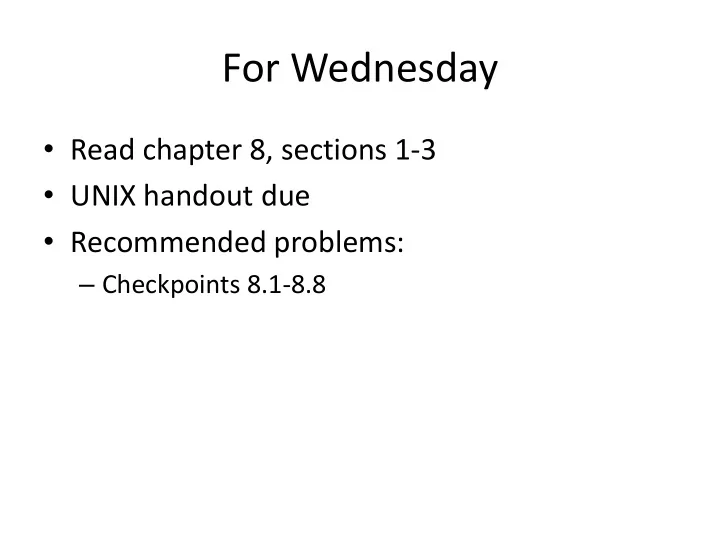

For Wednesday • Read chapter 8, sections 1-3 • UNIX handout due • Recommended problems: – Checkpoints 8.1-8.8
Exam 2 • Legible corrections due Wednesday, April 1 • Must be completely correct to get credit • Complete corrections on separate paper • Turn in graded exam with corrections • Worth 20 points on exam 2 (up to a maximum score of 105 – the original exam max) • May get help on this from me or each other (but don’t just show answers, please) • ADT definition must NOT be a duplicate of mine – must be your words • Expect linked list and stack coverage on exam 3 and on the final (which is comprehensive)
Program 6 • Any questions?
Towers of Hanoi • Three poles with disks of different size • May never move more than one disk at once • May never put a larger disk on a smaller one • Task is to move a stack of disks from one pole to another (may use the third pole for temporary storage of disks)
How Methods Work (in memory) • Activation record – created (brand new) each time method is called – contains information needed by method – space for variables in the method – put into stack - LIFO • Stack overflow – occurs when stack too full
Recursive Methods • A method that calls itself • With each call to the method, the parameters to the method change • An alternative to looping (though less efficient in most programming languages) • Two characteristics – 1. method defined in terms of itself, with each invocation working on smaller versions of the problem – 2. task has a terminal case that is nonrecursive
Structure of a Recursive method returnType MethodName(/* args */) { if (terminating_condition) // terminal case or base case else // reducing case (or recursive case) // always includes a call to MethodName }
Factorial • What’s the math definition for factorial?
Try It • Write a recursive method to compute an exponent. The method should take two integer parameters: the base and the power. The function should return a long.
Greatest Common Divisor • The greatest common divisor of two numbers can be computed as follows: – If the numbers are equal, their GCD is their value – If the first is greater, the GCD is the GCD of the second and the first minus the second – If the second is greater, the GCD is the GCD of the first and the second minus the first
Fibonacci Numbers • The Fibonacci sequence of numbers works as follows: x0 = 1 x1 = 1 x2 = x1 + x0 = 1 + 1 = 2 x3 = x2 + x1 = 2 + 1 = 3 x4 = x3 + x2 = 3 + 2 = 5 etc. • Write a recursive Java method to compute the nth Fibonacci number
Efficiency and Recursion
Recursive Method Tracing • int funA(int num) { int answer; if (num == 10) answer = 100; else answer = funA(num-1) + num; return answer; }
Example 2 • int funcB(int num) { int answer; if (num == 3) answer = 5; else answer = funcB(num+1) * 2; return answer; }
Recommend
More recommend